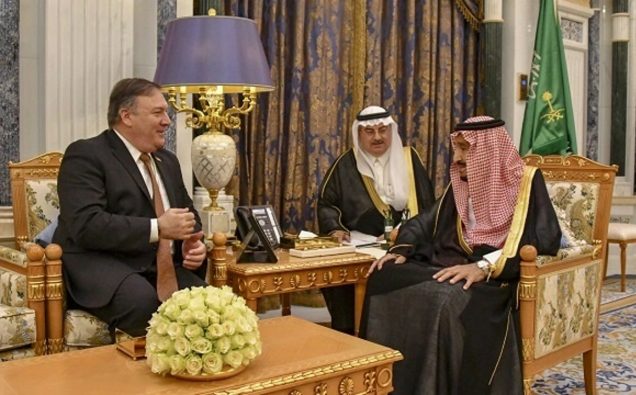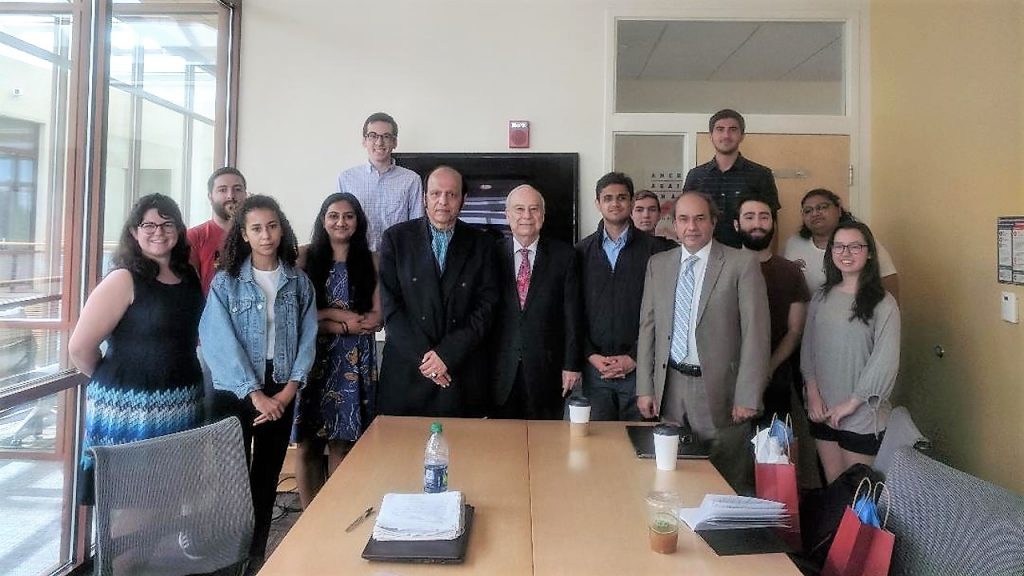
With the news that Riyadh is likely to admit that the missing Saudi journalist Jamal Khashoggi died accidentally during interrogation gone wrong, the United States is facing a huge foreign policy test.
President Donald Trump’s predecessors, presidents Barack Obama and George W Bush, also faced some testing turns in the U.S. relations with the Muslim countries during their White House terms. Both – due to different sets of reasons – both faltered and ended up on the wrong side of the history.
Bush invaded Iraq in 2003, causing an international inflexion point that still haunts the world in the form of ISIS and exacerbation of sectarianism and Middle Eastern instability – a fertile ground for militant organizations. Obama disappointed the Middle Eastern nations when he dithered on the question of backing Arab Spring of democratic movements against U.S.-favored strongman rulers, and then allowed Bashar al Assad to violate the White House-set red line of using chemical weapons against Syrians.
But the question that President Trump faces now over U.S. response to Khashoggi’s disappearance form Saudi consulate in Istanbul is one of the most closely watched issues. It’s not just going to be a delicate dance for U.S. president but also very much a question of America’s image and advancement of democracy in the Muslim world.
Just a week ago, I participated in a conversation on U.S. relations with the Muslim world with author Mowahid Hussain Shah as the lead speaker. The discussion with young American University scholars of Islamic Studies took place at the invitation Prof. Akbar Ahmed, Ibn Khaldun Chair of Islamic Studies, who enriches the perspectives of his class with views of scholars and experts from around the world.
Mowahid Shah, the first Pakistani to be admitted to the U.S. Supreme Court Bar, set the scenario for discussion by pointing out that instead of taking the diplomatic route, the U.S. foreign policy toward Muslim countries in the aftermath of 9/11 terrorist attacks has relied on excessive use of force – Afghanistan and Iraq wars.
That policy, interpreted as manifestation of anger, has backfired. Afghanistan remains in as bad as at any time despite the U.S. investment to the tune of billions of dollars. Iraq’s spinoff effect has taken the Middle East by storm. Both Bush and Obama could not connect with and respect people in the Muslim countries and sacrificed the art of finding peaceful solutions at the altar of political expediency. He also drew attention to the discriminatory approach to Iranian and Israeli nuclear programs. As a consequence, the U.S. image has suffered greatly.
He also underscored the importance of U.S. role toward resolving the Palestinian and Kashmir questions – two of the most glaring issues of the time.
Shah interspersed his argument with cultural conversation drawing on American metaphors and Hollywood movies, and reminded that America is much more than just the use of force – principles, diplomacy and alliances for peace.
In my remarks, I contrasted the post-9/11 foreign policy decisions with how Washington led the world in the 1990s, a period considered a high point in U.S. foreign policy as it followed Soviet Union’s defeat in Afghanistan and the fall of the Berlin Wall – the end of the bipolar world.
President Bill Clinton’s two foreign policy achievements – Dayton Peace Accords and his effort to end the Serbian genocide of Bosnian Muslims elevated America’s image in many parts of the world.
America, I said, cannot just walk away from the world or the Middle East, despite the many flaws of its policies.
Hassan Khan, an upcoming Daily Times journalist, touched on how U.S. discriminatory approach toward India – which has been given a civilian nuclear deal – and Pakistan – which remains a constant target of criticism – has created a sense of disparity and strategic imbalance.
The AU students keenly followed the presentations and came up with very pertinent inquiries about the state of U.S. relations and its ME policy, and what could be the way forward.
Now with the Saudi journalist Khashoggi’s disappearance, the U.S. foreign policy approach toward Saudi Arabia – considered a key source of oil, ally and counterweight to Iran – faces an unprecedented diplomatic test that concerns the lack of democracy in a majority of Muslim countries. Trump has vowed “severe punishment” but suggested that there may be some rogue elements at work in the case of Khashoggi. In an appearance in CBS 60 Minutes program, he also ruled out the prospect of U.S. backing out of arms deals with the Saudis.
Meanwhile, Kashmir and Palestine remain sore points. Approaching the two UN-recognized disputes with the intent to find fair resolutions to them would not only require diplomacy and intensive talks but also bold U.S. leadership, Militant groups like al-Qaeda, ISIS and the Taliban use these festering issues as grievances to spread their violent narratives.
The paradox of U.S. foreign relations with the oil-rich Middle Eastern countries has been the choice America makes between autocratic rulers and the people. Autocrats are just a phone call away when it comes to acting at Washington’s behest. Democracies, on the other hand, are messy, noisy and difficult to deal with. But the U.S. proclivity to deal with strong man rule creates a major disconnect with the ME people because dictators and autocrats have a their own disconnect problem with their people. For the U.S. this disconnect creates image problems.
George W Bush listened to the calls for nation building and his administration supported revival of democracy in Pakistan, which lately has nosedived on the index of media freedom. Barack Obama paid some lip service to the goal of democracy but fell woefully short of translating his commitment to action when the Arab Spring demanded, most notably in Egypt and Syria. Now skeptics and critics sees these goals moving even farther from realization as President Trump follows America first foreign policy on economic, climate and international policy issues and has declared that the U.S. would not tell other countries how they should live.
He has sent Secretary of State Mike Pompeo to Riyadh for meetings with King Salman bin Abdul Aziz and Crown Prince Mohammed bin Salman with a call for thorough investigation into the disappearance of Khashoggi.
But the international spotlight on Khashoggi issue reveals that the U.S. support for democracy will be critical to the future of its leadership in an environment of globally growing social media platforms, fast-paced implications for stock markets and ceaseless news cycles. For now, the U.S. relationship with Saudi Arabia – already under scrutiny over Yemen conflict – has emerged as a potential issue just weeks from November 6 midterm elections.















